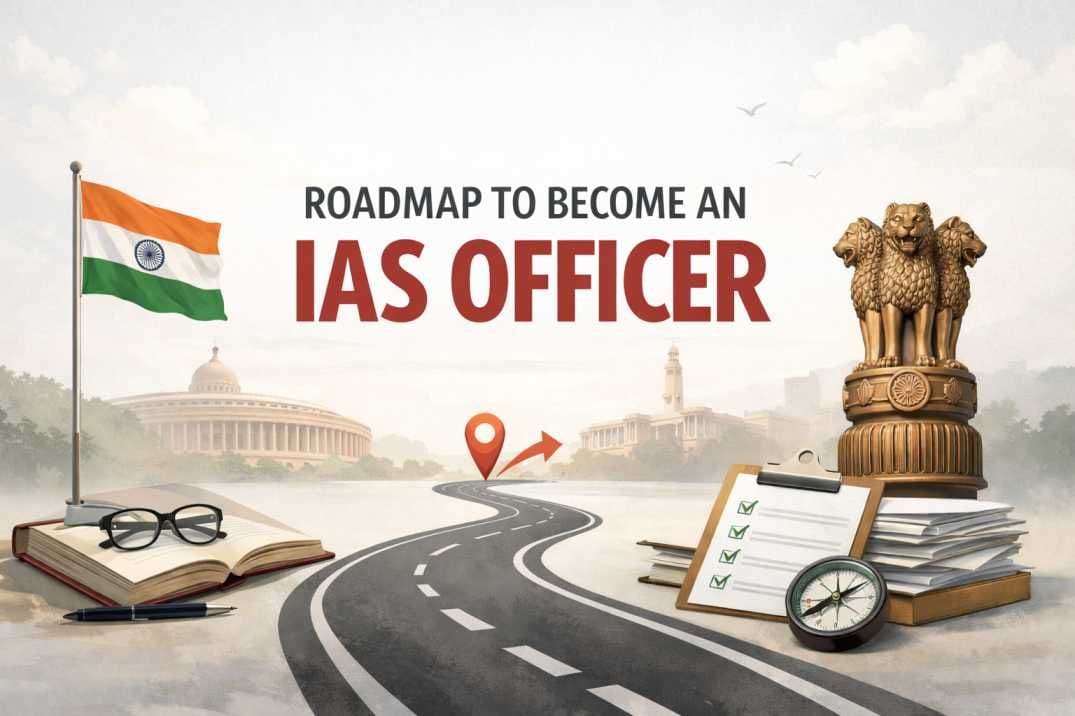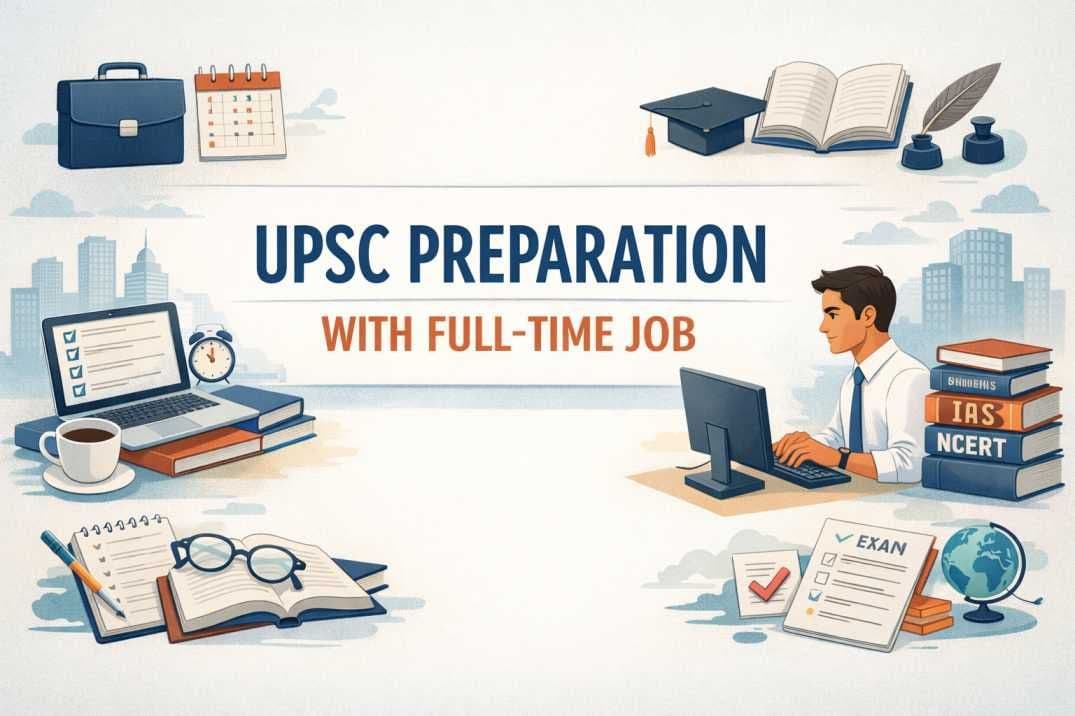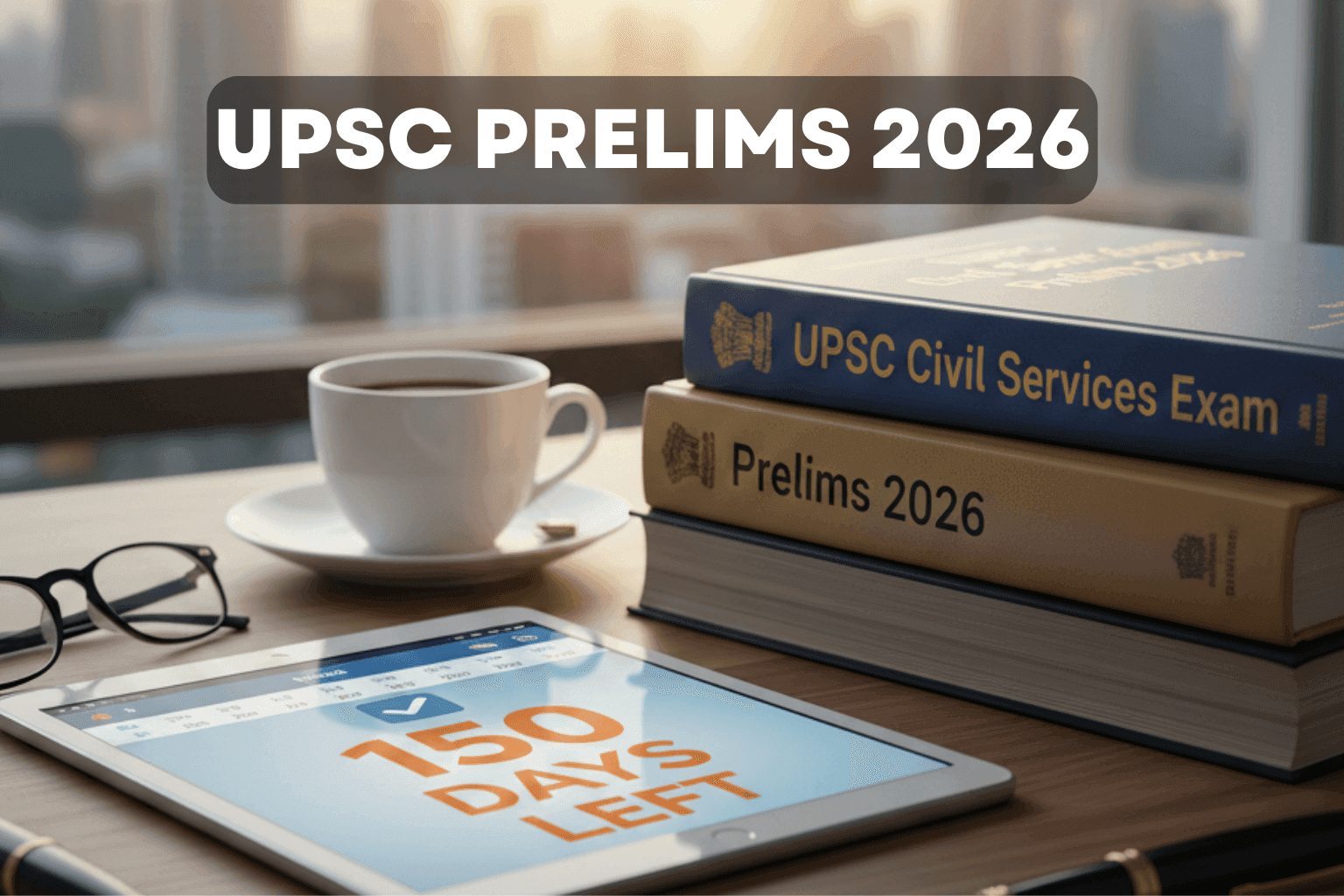How to Start UPSC Exam 2026 Preparation: A Complete Guide to Success
Jul, 2025
•4 min read
Starting your UPSC 2026 exam preparation is an opportunity to begin with one of the most meaningful journeys in your life. With the Prelims exam set for May 24, 2026, you have enough time to build a strong foundation and master everything you need to succeed. Starting early gives you a massive advantage over others, and with proper planning, you can turn your dream of becoming a civil servant into reality. But preparing for one of India’s toughest exams can feel overwhelming without the proper roadmap.
But don’t worry! We’re here to guide you step by step from the beginning. This complete guide will help you prepare for the UPSC 2026 exam. You will also learn how to master every stage of the UPSC exam, with a list of NCERTs and other static books for each subject.
Understanding UPSC 2026: Key Dates and Structure
The UPSC notification for 2026 will be released on January 14, 2026. The Prelims exam is scheduled for May 24, 2026, and the Mains exam will start on August 21, 2026. The UPSC exam has three stages:

Stage 1: Preliminary Examination (Prelims)
The Prelims serves as a qualifying examination with two papers:
- General Studies Paper 1: 200 marks, 2 hours duration, covering History, Geography, Polity, Economics, Environmental Studies, and Current Affairs.
- Civil Services Aptitude Test (CSAT): 200 marks, 2 hours, focusing on comprehension, logical reasoning, and analytical ability.
Only candidates clearing this stage advance to the Mains examination.
Stage 2: Main Examination (Mains)
The Mains examination comprises nine papers, with seven counting toward final merit:
- Paper A: Indian Language (300 marks, qualifying)
- Paper B: English (300 marks, qualifying)
- Paper I: Essay (250 marks)
- Papers II-V: General Studies I-IV (250 marks each)
- Papers VI-VII: Optional Subject (250 marks each)
Total scoring papers carry 1,750 marks.
Stage 3: Interview (Personality Test)
The final stage involves a 275-mark interview lasting 30-40 minutes, assessing personality, leadership qualities, and analytical ability.
Phase-wise UPSC 2026 Preparation Strategy
A phase-wise UPSC 2026 exam preparation strategy helps you break down the vast syllabus into manageable steps, making your study journey systematic. Here’s a clear, practical approach divided into key phases.
Phase 1: Foundation Building (July-October 2025)
- Start with NCERT books as they form the backbone of UPSC preparation. Begin with class 6-12 NCERTs for History, Geography, Polity, and Economics. These books provide clear, fundamental knowledge that even complex questions are based upon.
- Build your study routine gradually. Start with 4-5 hours of focused study daily, including 1-1.5 hours for current affairs. As recommended, consistency matters more than intensity.
- Focus on understanding concepts rather than memorizing facts. Use SuperKalam personalized learning modules to get bite-sized lessons built on NCERTs and standard sources.
- Optional Subject Selection: Choose your optional subject early, considering factors like:
- Personal interest and academic background.
- Availability of study material
- Overlap with the General Studies syllabus.
- Scoring potential
Popular choices include History, Geography, Public Administration, Political Science and International Relations, and Sociology.
Phase 2: Intensive Preparation (November 2025-February 2026)
- Complete your syllabus coverage for both Prelims and Mains during this phase. Dedicate specific time slots for each subject. Aim for focused sessions of 2-3 hours each with short breaks.
- Start answer writing practice for Mains preparation. Write at least 2-3 practice answers daily and focus on structured, analytical responses.
- Join a reliable test series. Take at least 2 full-length mock tests per week and analyze weak areas thoroughly.
Phase 3: Intensive Revision (March-May 2026)
- Focus heavily on revision during these crucial months. Complete 3-4 rounds of revision for all subjects. Use short notes and mind maps for quick revision.
- Practice 10-15 full mock tests in the final 50 days. Follow the three-round strategy: Round 1 for 100% sure questions (1 hour 10 minutes), Round 2 for questions with 2 options eliminated (30 minutes), and Round 3 for remaining questions.
- Current affairs integration becomes critical. Read newspapers like The Hindu or The Indian Express daily. Use magazines like Yojana and Kurukshetra for in-depth analysis.
Phase 4: Answer Writing Mastery (June-Aug 2026)
For UPSC Mains success, answer writing skill is non-negotiable. Practice daily with these guidelines:
- Read questions carefully - spend the first minute understanding what's asked
- Structure your answers: Introduction → Main body with arguments → Conclusion
- Use examples and case studies to support your points
- Maintain neat handwriting and proper presentation
Phase 5: Interview Preparation Strategy
The personality test requires specific preparation:
Master Your DAF (Detailed Application Form)
- Understand every detail of your educational background, hobbies, and work experience.
- Prepare for questions about your state, district, and local issues.
Current Affairs and General Knowledge
- Stay updated with recent developments.
- Form balanced opinions on contemporary issues.
- Focus on your state and the optional subject-related current affairs.
Communication Skills
- Practice clear, structured answers.
- Work on body language and eye contact.
- Participate in mock interviews.
Common Interview Topics
- Personal background and motivation
- Current affairs and governance issues
- Ethical dilemmas and administrative challenges
- Your optional subject knowledge
Check out our latest initiative: Super Start with NCERT by SuperKalam: Master NCERT for UPSC.
Important Books for UPSC 2026 Exam Preparation
These are the most recommended resources for UPSC beginners. They explain concepts in simple words, cover all basics, and are trusted by toppers every year.
| Subject | Books |
| History |
|
| Geography |
|
| Polity |
|
| Economy |
|
| Science & Technology | Book by Ravi P Agrahari |
| Environment |
|
| Art & Culture |
|
Key Preparation Tips
- Start Early: Begin preparation at least 12-15 months before the Prelims exam.
- Consistency: Maintain regular study hours and avoid long breaks.
- Quality over Quantity: Focus on understanding concepts rather than rote learning.
- Regular Revision: Plan multiple revision cycles for better retention.
- Mock Tests: Take regular tests to assess preparation and improve time management.
- Stay Healthy: Maintain physical and mental health throughout the journey.
- Adapt Strategy: Be flexible and modify your approach based on performance analysis.
Fuel Your 2026 Prep with Insights from UPSC Rankers
Take inspiration from toppers like Kanishak Kataria, the 2018 AIR 1 topper, who left a high-paying job abroad to pursue his IAS dream; or Aditya Srivastava, the 2024 AIR 1 topper, who proved that focused, strategic preparation leads to success. And then there’s Mohan Lal, the 2024 Hindi medium topper from a humble farming background, whose journey shows that your roots don't define your reach.
These success stories are a powerful reminder that with the right strategy and consistent effort, cracking the UPSC exam is well within your reach.
Why SuperKalam AI is the Best for UPSC Beginners
SuperKalam is your AI-powered personal mentor, offering tools and guidance tailored to every stage of UPSC preparation:
- Practice Unlimited MCQs and attempt tests.
- Master PYQs with ease using our exclusive PYQ tool.
- 24x7 Doubt Resolution for your queries anytime, anywhere.
- Stay Updated on Current Affairs with our Daily News Summary.
- Instant Mains Answer Evaluation with detailed Model answers.
- Stay motivated with streaks and track progress with leaderboards.
Explore SuperKalam's Resources and set yourself on the path to success!
Conclusion
Success in UPSC 2026 requires: Strategic Planning + Consistent Effort + Smart Resources + Technology Support = UPSC Success.
Start your preparation early, follow a structured approach, use quality study materials, and incorporate SuperKalam for personalized guidance and instant feedback. Remember, every UPSC topper started where you are today - the difference lies in taking the first step and staying committed to the journey.
Join SuperKalam now and let’s turn your effort into excellence!
Also see: UPSC Calendar 2026: Exam Dates and Details


